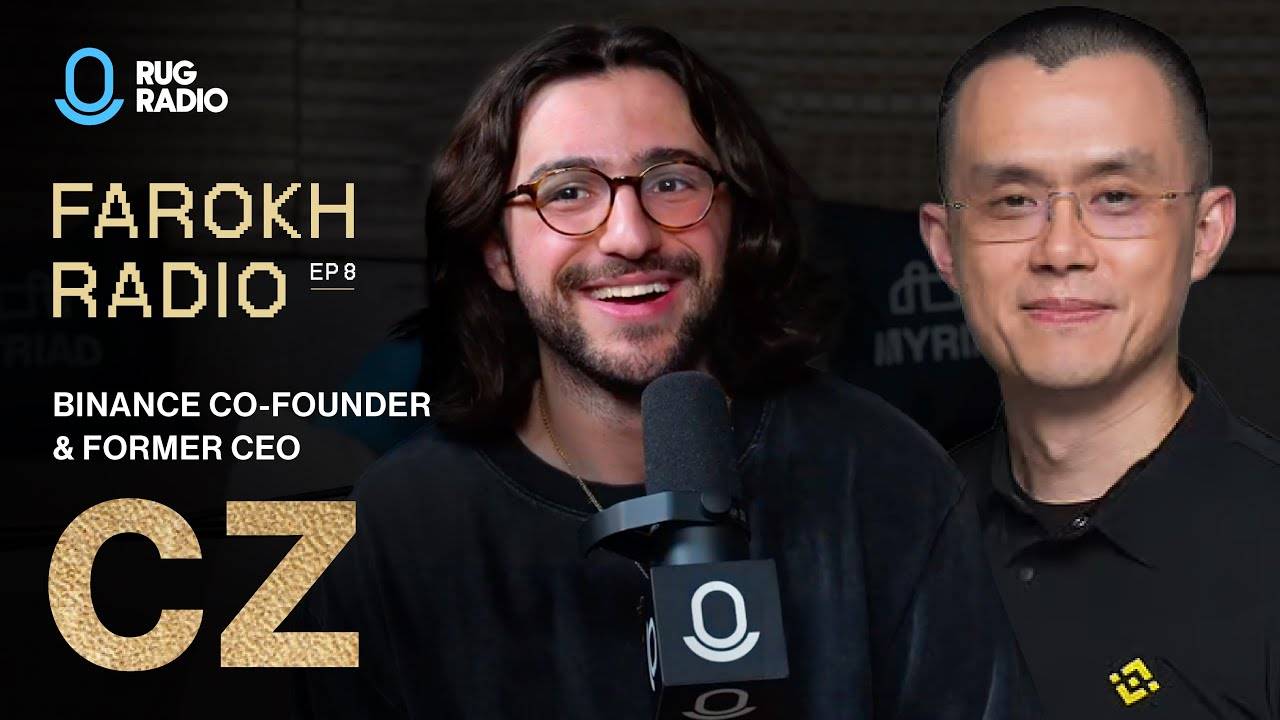整理 & 编译:深潮TechFlow

嘉宾:Changpeng Zhao,Binance 创始人
主持人:Farokh
播客源:FAROKH RADIO
原标题:CZ talks Life inside Prison, Trump Presidency, and state of Crypto!
播出日期:2025年5月6日
要点总结
在本次独家采访中,Farokh 与币安的创始人及前 CEO 赵长鹏 (Changpeng Zhao),也就是大家熟知的“CZ”,进行了一场深度对话。他们探讨了 CZ 的监禁经历,以及他如何从中汲取教训;他对特朗普可能的第二次总统任期的看法;同时也聊到了他对当前加密货币行业的整体看法和感受。
精彩观点摘要
-
比特币在这个周期的最高价格可能在 50 万到 100 万美元之间。年底时,加密货币市场的总市值大约为 5 万亿美元。
-
从目前的趋势来看,政府购买比特币的情况只会越来越多,我希望普通投资者能抢在政府之前买入比特币。
-
我意识到自己永远不会成为一个 Memecoin 交易者。我也不是一个加密货币交易者。我更倾向于作为一个平台的建设者,去搭建工具供人们使用,而不是亲自参与交易。
-
人工智能 (AI) 是一个非常重要的领域,我对科学领域特别感兴趣。此外,还有一些更贴近现实的应用领域,比如 RWA (真实世界资产),ETF 也是一个非常有趣的方向。
-
现在行业里一个显而易见的问题就是“ Memecoins”的过热,市场上有太多资金涌入这些 Memecoins。短期来看,99.999% 的 Memecoins 最终都会失败。
-
我认为传统媒体行业需要改变,否则它们会被时代淘汰。有些报道往往不是在调查真正的问题,而是带有明确的个人议题,专门针对某些人。这种做法不仅没有盈利,反而损害了公司的声誉。
-
我意识到健康才是最重要的,其次是家庭,然后才是工作和其他事情。在监狱里,你会发现自己并不真正想念美食,虽然偶尔会想念一张舒适的床,但最让我牵挂的还是家人。
-
过去,我对地缘政治等问题并不敏感,但现在我意识到,这些政治议程可能会直接影响到个人,甚至可能让你陷入困境。所以,我现在更加小心行事。
-
在未来,去中心化交易所将会比中心化交易所更大。我们希望在这些领域进行大量投资。
-
交易所的存在不仅是为了投机者,虽然他们提供了流动性,但更重要的是为长期建设者创造一个健康的生态环境。
-
我每周至少工作六天,有时候甚至是六天半。即使是周末,我也会安排会议。即便不在工作,我的脑子里也总是在想和工作相关的事情。
Farokh:大家好,我是 Farokh,欢迎收听 Rock Radio。今天的嘉宾是传奇人物 CZ,币安的创始人。非常感谢你抽出时间接受采访。你喜欢这里的生活吗?我知道你和这里的王室关系密切。住在沙漠中是一种什么样的体验?
CZ:我住在这里,所以我非常喜欢。其实我几乎可以选择世界上任何地方定居,但最终选择了这里,我觉得这个国家非常棒。迪拜虽然很繁华,但现在交通有点拥挤,人也多,发展速度很快。而阿布扎比则显得更安静低调,但同时又非常强大。我觉得这里是世界上领导能力最优秀的国家之一。
Farokh:今天我们有很多话题要聊,比如你对加密货币行业的看法、特朗普的总统任期、阿布扎比的政府政策等等。我本来还想聊聊加密立法,但觉得那部分内容太枯燥了,所以今天跳过它。我们可能会谈到你的监狱经历、中心化交易所和去中心化交易所的对比,甚至聊聊 Meme Coin。如果时间允许的话,我们还可以聊聊 Binance。当然,最后还有一个预测游戏环节,你今年的预测很准,那我们今天不妨看看接下来会如何。
不会成为一个 Memecoin 交易者
Farokh: 参与 BNB Memecoin (模因币) 的过程中有什么收获吗?
CZ:
我觉得这其实这很有趣。去年我在美国忙于其他事务,错过了 Memecoin 的整个热潮。等我回到这个领域时,大家都在谈论 Memecoins,但实际上,很多项目并没有真正的实用性。
这个过程其实挺有趣的,但也不容易。起初我以为只需要设计一张图片,然后发布就行了,但后来发现社区里有很多规则和礼仪。例如,当时很多人问我宠物的名字,还让我发一张照片。我完全没想到,一张照片竟然引发了那么多的 PvP。
一开始我觉得这只是个有趣的尝试,所以决定先发个预告,24 小时后再正式发布,想制造一些热度。结果没想到发布时竟然冒出了上千个“Broccoli”,社区之间还因此产生了争论。
这个过程中,我感受到 Memecoin 的文化和社区氛围非常强烈。同时,我也了解到,作为主要的交易者其实并不容易。他们每天都泡在群聊里,时刻关注哪些新币会爆火。经过这一切,我意识到自己永远不会成为一个 Memecoin 交易者。实际上,我自己也不是一个加密货币交易者。我更倾向于作为一个平台的建设者,去搭建工具供人们使用,而不是亲自参与交易。但无论如何,我们始终关注社区的需求,如果社区对 Memecoin 感兴趣,我们也会尽力支持。
当时我也想,“好吧,那我们来研究一下 BNB 链和它的生态系统。” 我开始更多地参与这个领域,因为大家希望我多花点时间在这上面,毕竟我的参与确实能为它带来更多关注。我也希望能为 BNBChain生态系统提供一些帮助。虽然我无法直接参与去中心化交易所 (DEX) 的事务,但在去中心化的 BNB 生态系统等方面,我没有任何限制。所以我会把时间投入到我能参与的地方,尽可能地推动生态发展。
看好 AI 与 Desci
Farokh: 你对行业中最感兴趣的部分是什么?
CZ:
其实在行业表面热闹的讨论背后,还有很多值得关注的事情正在悄然发生。
首先,人工智能 (AI) 是一个非常重要的领域。人工智能和区块链的结合潜力巨大。区块链可以直接利用人工智能的能力,而人工智能也能够在区块链上实现更多功能。
其次,我对科学领域特别感兴趣。我认为,从长远来看,科学的影响会非常深远。科学研究的融资一直是个难题,因为它通常需要很长的时间才能见效。对于那些追求短期回报的投资者来说,这显然不够有吸引力。但我相信,科学研究,特别是生物技术领域,将在未来变得至关重要。
通过加密货币和智能合约,我们可以为科学项目筹集资金,并根据研究进展或时间节点来分阶段发放资金。这种模式还能激励全球数以百万计的小型研究实验室参与进来。结合大数据和人工智能的能力,我相信我们在药物研发和人类生物学的理解上会有显著的突破。这些进展不仅是可能的,而且实际上已经在逐步实现了。
此外,还有一些更贴近现实的应用领域,比如 RWA (真实世界资产)。一些大型传统公司正在这一领域展开探索,比如贝莱德正尝试通过区块链技术进行资产交易。
另外,ETF 是一个非常有趣的方向。它将传统金融机构的资金引入了加密货币市场。在美国,机构投资者占据了大部分资金流入,而在其他地区情况稍有不同。我们已经能看到这种趋势的影响,比如最近比特币价格的上涨,就与基于比特币的 ETF 推动密切相关。所以,我认为行业中还有很多值得期待的事情正在发生。
加密货币的机构化是否对其精神构成威胁?
Farokh: 你是否担心加密货币的发展已经变得如此庞大,以至于开始涉及到政治领域?现在甚至连 ETF (交易所交易基金) 都出现了。从价格走势来看,比特币的机构化显然是一个积极因素,对吧?我们的资产在上涨。虽然山寨币的表现没有那么好,但至少比特币的价格在走高。你觉得这种机构化是否会对比特币白皮书中倡导的去中心化精神构成威胁呢?
CZ:
的确会有一些影响。任何事物都有两面性,没有什么是完全好的或者完全坏的,所以我们需要在其中找到平衡。
作为早期的比特币支持者和去中心化信仰者,我们会希望政府尽量晚些介入,尤其是在购买比特币这件事上。很多人希望普通投资者、普通用户能够在政府大规模买入之前,先拥有一些比特币。关于这一点,不同的人会有不同的看法。当然,从另一个角度来看,政府购买比特币会对价格产生积极的推动作用,同时也能强化人们对比特币的信心。所以这件事有利有弊。
总的来说,在一个去中心化的世界里,我们无法控制其他人的行为,也无法左右政府的决定。美国的态度变化就是一个很好的例子,100 天前美国政府对加密货币的态度还比较冷淡,但现在他们似乎意识到购买比特币是正确的选择。这种转变对整个行业来说是一个好消息,不过我还是希望普通投资者能抢在政府之前买入。
Farokh: 所以他们还有时间,对吧?
CZ:
是的,我们一直在讨论加密货币,也一直在努力推动它的发展,他们其实有足够的时间去买入的。如果有人不想买,那也是他们的选择。
Farokh: 我听说你还在为巴基斯坦的一些政府部门提供建议,比拉班萨基也是你的朋友。此外,阿布扎比的主权财富基金最近也投资了 Binance。从目前的趋势来看,政府购买比特币的情况只会越来越多。这在美国已经引发了多米诺效应,我认为这是一个重要的转折点,甚至可能影响到其他国家的决策。
99.99% 的 Memecoins 最终都会失败
Farokh: 在过去的周期中,你对行业中的一些腐败现象有着敏锐的洞察力,你对这个行业的直觉一直很准。那么这次,你认为行业中存在哪些问题或潜在的“隐患”?我们应该特别注意什么?
CZ:
现在行业里一个显而易见的问题就是“ Memecoins”的过热,市场上有太多资金涌入这些 Memecoins。短期来看,99.999% 的 Memecoins 最终都会失败。据统计,CoinMarketCap 上目前跟踪了大约 1300 万个代币,你可以想象其中绝大多数都不会有未来。这是一个高风险领域。不过幸运的是,大部分meme币的投资者对此已经心知肚明,因为失败的案例实在太常见了,他们已经接受了这个事实。但与此同时,这种现象也让人们对真正有实际用途的项目关注度降低了。
过去四年,尤其是在上一届政府期间,开发一个合规的加密项目是非常困难的。美国证券交易委员会 (SEC) 经常起诉项目方,声称他们的代币是证券等等。幸运的是,最近一些这样的诉讼已经被撤销了。所以我相信,未来会有更多的开发者重新加入这个行业。虽然这个行业曾经被迫以一种不太健康的方式发展,但现在我对未来更加乐观,因为它正在朝着正确的方向前进。
Farokh: SEC 的确让人感到压力很大,比如说,他们可能会把你送进监狱。作为行业里的创始人,我们总是对代币化感到担忧。甚至像 NFTs 这样的资产,在谷歌实验室的案件中一度被标记为证券,比如 CyberKong 这样的项目,最后这些指控才被撤销。现在,我觉得作为创始人,我比以前更有信心去冒险了,因为我感觉能够承担更多的风险。毕竟,我们需要在这个行业中保持一种探索和冒险的精神,尤其是在人工智能这样的前沿领域。
CZ:
确实如此。很多优秀的美国企业家已经选择离开美国,这对美国经济以及美国在加密货币和人工智能领域的领导地位都是不利的。不过,我没想到一场选举会带来如此大的政策转变,这也从另一个角度说明了民主的力量。
传统媒体需要改变
Farokh: 最近,《华尔街日报》和《彭博社》发表了一些批评加密行业的文章,引发了广泛的讨论。你怎么看待这些报道?
在路上,我看到你发推提到了《华尔街日报》,还引用了 Elon Musk 的推文,讨论假新闻的问题。特朗普也经常谈到类似的话题。虽然这些报道未必完全是假的,但它们的确带有明显的负面倾向。这也是我创立 Rug Radio 的原因之一。后来我们与 Decrypt Media 合并,因为我一直认为 Decrypt 是加密领域中新闻质量最高的媒体之一。我们的目标是尽可能积极地展现加密技术和新兴科技的潜力。当然,这并不意味着我们忽视负面新闻,但我们也不需要只报道负面的内容。像《华尔街日报》和其他主流媒体,似乎总是尽可能地以负面角度报道我们。最近,他们甚至对你进行了个人攻击,比如声称你在监狱里为了减刑而“出卖”其他加密行业的创始人。对此你怎么看?
CZ:
确实,传统媒体通常会挑选一个目标人物,然后集中火力攻击他们。他们可能会选择 Elon Musk、特朗普,或者是我以及其他人。围绕这些目标,他们会发布大量带有负面倾向的文章。
但幸运的是,现在这种方式已经不再那么有效了。传统政府虽然声称支持言论自由,但实际上通过资金支持某些新闻机构,间接影响报道内容。这种策略过去可能奏效,但现在反而适得其反。
比如,某些政党在选举中失败,就说明了人们对传统媒体的信任正在减弱。现在社交媒体让我们每个人都有了发声的机会。通过视频、会议等形式,我们可以直接与公众互动,展现真实的自己,而不是让某些文章定义我们。虽然这些负面报道依然让人感到烦恼,但我们至少有了自己的平台,可以表达真实的观点。比如,我的社交媒体粉丝数量可能比大多数政客还多,而 Elon 的粉丝更是远超其他人。随着社交媒体的崛起,真实的声音变得越来越重要,因此我们对此已经没那么担心了,但它仍然让人感到不快。
Farokh: 这确实令人头疼。因为这些报道会影响外界对我们的看法。我们行业内部的人都了解实际情况,但外部的人更倾向于分享《彭博社》和《华尔街日报》的文章,而不是像《Decrypt》这样的专业加密媒体的报道。
CZ:
我曾与彭博社的一位高管聊过,他提到他们甚至在考虑取消调查新闻部门,因为这些报道往往不是在调查真正的问题,而是带有明确的个人议题,专门针对某些人。这种做法不仅没有盈利,反而损害了公司的声誉。彭博社本质上是一家技术公司,而不是媒体公司。他们主要通过销售终端设备赚钱,媒体业务对他们来说反而是个负担。
我还听说,现在彭博社超过30%的新闻内容是由 AI 生成的,但这些主要是快讯类新闻,比如市场行情变化等,不涉及调查报道。这些快讯因为更加客观和数据驱动,受到更多关注。相比之下,带有强烈主观倾向的报道却在损害公司的形象。所以,我认为媒体行业需要改变,否则它们会被时代淘汰。
Farokh: 我们也在尝试改变。比如,我们通过 Crypmedia 和 Rug Radio 这样的资源发展预测市场 (Prediction Markets),实时捕捉市场情绪。就像 Polymarket 在特朗普选举期间的表现,媒体报道和公众的实际投资行为之间往往存在明显差异。
监狱中的艰难时刻与改变
Farokh: 你在监狱的经历是否对你的生活方式和工作方式产生了深远影响?
CZ:
当然有。这种经历总会让你重新思考生活的优先级。首先,我意识到健康才是最重要的,其次是家庭,然后才是工作和其他事情。
在监狱里,你会发现自己并不真正想念美食,虽然偶尔会想念一张舒适的床,但最让我牵挂的还是家人。你不会想念金钱,也不会特别想念工作,尽管辞去币安CEO的职位对我来说确实有些感伤。
我始终是一个建设者,所以无法停下脚步。幸运的是,我虽然不再年轻,但也不算太老,依然有精力去做一些事情。现在我把精力放在帮助基金、为其他创业者提供建议,以及和他们交流学习上。同时,我还在建立一个教育平台。虽然仍然很忙,但我相信,无论你身在何处,都可以通过不同的方式产生积极的影响。
另外,这次经历让我变得更加谨慎。过去,我对地缘政治等问题并不敏感,但现在我意识到,这些政治议程可能会直接影响到个人,甚至可能让你陷入困境。所以,我现在更加小心行事。
出狱后,我花了一段时间来适应生活。刚开始的几个月,我很少在社交媒体上活跃,也没有参加任何活动。经过一段时间调整,我才慢慢恢复到正常状态。
Farokh: 你在里面交到朋友了吗?
CZ:
我确实和几位朋友保持了联系。在任何地方,你都有可能遇到好人。当然,也有一些人受到了过度的惩罚,他们可能犯了一些错误,但惩罚却过于严厉。我仍然和一些在监狱里的朋友保持联系。他们的处境很艰难,几乎没有律师可以帮助他们,尤其是外面的律师费用非常高。他们也很难获取信息,因为监狱里没有互联网,通信只能通过一种非常落后的系统,甚至无法发送图片或链接。
Farokh: 那你在监狱里能知道比特币的价格吗?
CZ:
完全不知道。不过,有人会通过消息问我过得怎么样,顺便问比特币和币安币 (BNB) 的情况。监狱里有几台电视,但大多数播放的是情景喜剧和体育节目。我不看体育,也不看电视。不过,有几个囚犯对加密货币感兴趣,所以他们专门开设了一个金融频道。我在监狱里看到了一些新闻,比如总统被刺杀的事件,以及特朗普面临的34项刑事指控。
其中一项指控是他把机密文件带进浴室,我觉得这真的很荒谬。如果我的员工这么做,我可能还会给他发奖金呢,毕竟这说明他在努力工作。回想起这些事情,虽然当时压力很大,但现在看来确实有些滑稽。
就在我入狱前五天,伊丽莎白·沃伦还在公开信中宣布对加密货币的“战争”。如果当时我没有那么大的压力,我可能会觉得这些事情挺搞笑的。但现在回想起来,确实有点荒唐。
Farokh: 能否分享一些你在监狱经历的艰难时刻,比如监狱的生活环境、与杀人犯同住一间牢房的感受,以及面对恐惧时的心理变化?
CZ:
监狱生活真的非常艰难。虽然现在回忆起来我可以笑着说起,但那时的感受完全不是这样。这不是一个可以开玩笑的经历,也绝对谈不上有趣。我不希望任何人经历这样的事情。虽然我一直认为自己压力承受能力很强,性格也算冷静,但在那种环境下,还是非常难熬。我经历了搜身、被锁在牢房里,还有第一次与一个双重谋杀犯同住一间牢房的经历。
在监狱里,工作人员并不会在意你是谁,对他们来说,你只是另一个囚犯。我并没有受到特殊待遇。有人告诉我,我在监狱里可能被监控,这可能是唯一的不同之处。但其他囚犯和警卫并不知道我的身份,他们只是在完成自己的工作。
我的室友是一个因双重谋杀被判30年的人。他因为表现良好,服刑12年后被转到了低安全级别的监狱,这已经是他能去的最低级别了。监狱里的囚犯通常会按种族分组。我和一个美洲原住民共用一个牢房,我们相处得还不错。但即便如此,初入监狱的那一刻,还是让我感到非常恐惧。进入监狱后,首先要经历一系列检查,包括拍照、回答问题、搜身等。随后,我被带到监区。当我第一次走进监区时,看到三层楼高的建筑,两排牢房相对而立,里面有240名囚犯。大家都在大声喧哗,许多人身上布满纹身,看上去非常凶狠。那一刻,我心里想,这地方不好玩。
警卫告诉我我的牢房在五楼。我走过去想开门,却发现门是锁着的。后来,一个壮汉过来告诉我,门需要警卫来开。所有人都在注视着我这个新来的囚犯,那种感觉压力很大。
有趣的是,尽管这些囚犯看起来很凶,但实际上他们都很有礼貌,也很友好。我在监狱里并没有和囚犯或警卫发生过冲突。不过,最难熬的还是心理上的压力。我一直担心他们可能会随便找个理由,让我多留几个月,甚至再加一些罪名。这种事情在很多囚犯身上都发生过,就像“加州旅馆”一样,你可以入住,但却永远无法离开。
如果有人明确告诉我“你只需要待四个月”,我会觉得“好吧,没问题,我可以熬过来”。但在监狱里,很多事情的不确定性让我感到非常焦虑。即使我后来被送到了半途之家 (Halfway House),在最后一个月,我还是被移民局逮捕,理由是我的签证过期了。尽管我们已经申请了签证延期,但被拒绝了,结果我被迫继续留在美国。
在拘留中心待了几天后,我的律师成功撤销了拘留令,但他们并没有让我回到半途之家。这些经历我都在书中有详细描述。
关于 SBF(Sam Bankman-Fried)
Farokh: 关于 SBF(Sam Bankman-Fried),你现在怎么看待他?他还在服刑。经过你自己的监狱经历,你是否对他多了一些理解或同情?
CZ:
公平与否,我不想多做评价。我不希望任何人经历监狱生活,那绝对不是一段轻松的经历。但我也认为,任何涉及欺诈、撒谎和欺骗的行为都必须被制止。这种行为不应该存在。不过,美国的刑期确实偏长,但也有减刑机制,比如表现良好每30天可以减刑10天,所以大多数人实际服刑时间是判刑的三分之二左右。虽然如此,我仍然对所有在监狱里的人抱有同情,因为那段经历真的很难熬。
在监狱里,我看到很多被判10年的人,他们的生活几乎被完全定型了。他们不再考虑自我改造。虽然大多数人都清楚自己做错了什么,但很多人却因为过重的惩罚失去了改过的机会。他们只是按部就班地过日子。如果没有真正的矫正措施,监禁的意义就会被削弱。
而且这种过度惩罚还会浪费大量纳税人的钱。我也不清楚最有效的矫正方式是什么,但如果真的想让人们改变,就应该让他们从错误中吸取教训并重新开始。所以,我不想对刑期的长短或是否公平发表明确意见。
只要我们继续推动行业向前发展,这才是最重要的。但不可否认的是,SBF 的事件对整个加密行业造成了非常大的负面影响,让我们整个领域都笼罩在一片阴影之下。
特朗普与 $TRUMP
Farokh: 你提到过唐纳德·特朗普几次。显然,你在监狱里目睹了他的崛起,这是否让你对自己的刑期感到更乐观?毕竟你曾提到过对长刑期的担忧。
CZ:
是的。当时他被控34项罪名,法官和陪审团都认定成立,这让我觉得非常不可思议。后来,他宣布竞选总统,我心想,这或许是一件好事。接着,他开始公开支持加密货币,而且看得出来,他的支持是认真的,不只是说说而已。
所以我认为,这对加密行业来说是个积极的信号,也给那些可能被不公平指控的人带来了一些希望。在监狱里关注这些新闻时,我觉得我们这个行业很幸运,因为当时的美国总统对加密货币持支持态度,他的确是个很聪明的人。
Farokh: 我知道很多加密行业的创始人会通过游说活动争取支持,比如通过捐款获得接触机会。我记得在一次数字峰会上,我拿到了白宫的通行证,得以对加密行业进行报道。当时我也看到很多中心化交易所的创始人出现在那里。所以我想知道,你们是否也有类似的接触?
CZ:
没有。作为一家外国公司和外国公民,我们无法向任何政治活动捐款。这是法律规定的,我对此非常谨慎,绝对不会涉及任何与选举相关的事情。
我依然是 Binance 的大股东。所以无论是公司还是我个人,都不会参与任何与选举相关的活动。我非常小心,避免触碰这些敏感领域。至于我出狱后,我们在美国并没有开展新的活动。Binance 美国仍在正常运营,但除此之外没有其他动作。之前有一些新闻报道称,我试图用 Binance 美国的股权换取赦免,这完全是虚假的。我从未与任何人讨论过 Binance 美国的股权问题,它的股权结构也没有发生任何变化。所以,这些报道纯属虚构。
Farokh: 关于你申请总统特赦的事情,目前有什么进展吗?
CZ:
我们希望通过一些合适的新闻报道来传递真相,比如可以联系 Ryan 这样的专业人士,确保信息准确无误。如果我能获得特赦,我相信这对整个行业来说会是一个积极的信号。不过,现在只能静观其变了。
Farokh: Arthur 已经成功获得了特赦。我当然也希望你能成功申请。我觉得这是完全可能的,我知道你是有资格申请的。
CZ:
是的,我相信团队会支持我,这让我非常感激。毕竟,大家都在为行业的发展努力。
Farokh: 你对申请的法律程序都清楚吗?
CZ:
是的,我已经委托律师在处理这件事了。其实是在彭博社发表相关报道之后,我们才决定正式提交申请。当时我想,既然报道已经出来了,不如顺势而为。Arthur 的特赦申请也很快得到了批准。所以我们是在大约两周前提交的申请,现在只能等待结果了。
Farokh: 你如何评价特朗普总统目前的执政表现?你认为美中之间的贸易战是否有可能结束?
CZ:
我认为特朗普总统的表现很不错,他非常懂商业运作。虽然很多人对关税等政策感到担忧,但我认为这更像是一种谈判策略,而不是传统的地缘政治博弈。在商业谈判中,通常会先开出高价,然后通过协商逐步让步,最终找到一个双方都能接受的平衡点。这种方式虽然对行业和经济的短期影响很大,但从某种程度上来说,也让人耳目一新。特朗普总统很擅长达成交易,我相信他最终会促成协议。
Farokh: 那你觉得美中之间的贸易战会更早结束吗?
CZ:
我认为有可能。中国方面的谈判者非常聪明,他们清楚自己的目标和策略。不过,我觉得中国可能不太认同特朗普总统的谈判风格。亚洲文化通常非常注重“面子”,如果公开提出过于强硬的要求,可能会引发反感。
这确实反映了文化差异。在美国,尤其是在特朗普总统的领导下,他经常通过社交媒体直播会议,这种透明度在其他政治领导人中并不常见。这种风格非常特别。
不过,我相信双方都有优秀的顾问团队,他们对彼此的文化差异有深入的了解。所以我对谈判的前景还是很有信心的。至少现在双方已经坐下来对话,而不是像以前那样完全切断联系。之前更多是软实力的较量,而现在双方开始直接沟通,这让我对未来感到乐观。
Farokh: 你对 TRUMP Coin 有什么看法?
CZ:
我对它了解不多,因为听到的说法非常不一致。一些人说它和特朗普关系密切,而另一些人则表示完全无关。我自己并没有深入研究过。
Farokh: 不过,它确实和特朗普有点关联,对吧?比如他们计划在 5 月 22 日举办一场晚宴,邀请前 20 名持有者参加。
CZ:
确实有些联系,但我并不是 TRUMP Coin 的前 25 名持有者。
Farokh: 是不是因为媒体的报道让你选择远离它?
CZ:
我尽量避免和这些事情扯上关系。媒体的关注和可能的负面报道让我觉得参与其中并不明智。所以我决定不买 TRUMP Coin,也不想让自己和它有任何联系。
Farokh: 你觉得阿联酋的领导层是否在借鉴特朗普的方式?你如何评价他们的前瞻性?
CZ:
阿联酋的领导层非常具有前瞻性。他们不仅聪明,还富有远见和战略眼光,处理问题时也非常灵活。早在区块链技术兴起之初,他们就已经意识到石油资源并非永续之计,必须拓展其他经济领域。而在多元化发展中,他们在区块链和人工智能方面的投入尤为突出。这些都是未来的关键技术,而阿联酋的领导层对此有着深刻的理解。
此外,阿联酋与美国之间的关系也非常融洽。我虽然不清楚具体细节,但听说他们在人工智能和区块链等领域开展了不少合作。这种国际合作进一步体现了阿联酋的开放性和前瞻性。
我认为领导力非常重要,一个好的领导者能让国家发展得很好。我认为无论使用哪种制度,民主、君主制等,很多人可能会被系统束缚,但真正重要的是领导者。在任何制度下,即使是民主制度中也会有糟糕的领导者。而在有价值的设计和强有力的领导者的地方,商业才能蓬勃发展。他们会努力寻找没有税收的政策、合理的监管框架等。我认为我们在这里看到了这一点,在美国也看到了。
对比 DEX 与 CEX
Farokh: 你觉得中心化交易所(CEX)和去中心化交易所(DEX)之间的竞争格局是否有变化?
CZ:
确实有变化。很多人把 CEX 和 DEX 看成对立的两极,但我认为这种看法并不准确。这两者都是用户接入区块链的工具。没有区块链,CEX 也无法存在。它们只是帮助用户进入去中心化世界的不同方式。对于普通用户来说,用电子邮件和密码登录显然比管理复杂的私钥要容易得多。
CEX 和 DEX 其实是通向同一目标的不同路径。作为行业的解决方案提供者,我们的任务是为用户提供多样化的选择,而不是仅仅依赖某一种模式。CEX 并不是终点,而是帮助用户接入区块链的桥梁。
我们在 CEX、DEX、永续合约以及区块链开发等多个领域都有投资。我认为 DEX 和永续合约市场潜力巨大,现在仍处于早期阶段,还有许多需要探索和完善的地方。
不过,目前完全透明的交易模式可能并不适合所有情况。比如,你可以看到某个大户挂了 3 亿美元的空单,但实际上,真正的机构投资者并不希望自己的交易被公开。因此,大型机构的交易方式往往和普通用户不同。
是的,确实如此。传统上,去中心化交易池通常比我们所称的订单簿要大得多。所以我认为这里有很多成长空间,但我确实认为未来是去中心化的。我多次说过,在未来,去中心化交易所将会比中心化交易所更大,我们希望在这些领域进行大量投资。
Farokh: 你们已经开始投入了吗?
CZ:
我们已经投资了多个 DEX 和永续合约项目。不过现在我不直接管理这些项目,我们通常只是持有少量股份。
Farokh: 最近,很多人认为如果某个币在中心化交易所上市,那对它来说是一个见顶信号。现在似乎变成了,既然它在中心化交易所上市了,就会失去去中心化交易所的热度,我感觉这种看法已经改变了。
CZ:
确实有些变化,但这主要是短期投机者的观点。他们把 CEX 上市当作最后的机会,但对真正的建设者来说,上市只是一个起点,而不是终点。
交易所的存在不仅是为了投机者,虽然他们提供了流动性,但更重要的是为长期建设者创造一个健康的生态环境。
加密交易所高管群聊事件
Farokh: 你现在还会和其他交易所的高管交流吗?之前《纽约时报》报道过,你和 SBF 在一个高管群聊中有过一些争执,后来我们也知道了接下来的事情。你能分享一些关于那个群聊的细节吗?你们现在还会经常交流吗?
CZ:
我偶尔会和他们聊聊,但并不频繁。首先,我们都很忙;其次,交易所之间也存在一定的竞争关系。那个群聊大概有 10 位交易所创始人,确实存在。其实,这个群聊是在 Luna 崩盘的时候创建的。当时,他们计划推出 Luna 2,其中有一位来自 FTX 的人,他之前在 Bitfinex 和 OKX 工作过,对行业内的情况非常熟悉。
群聊的初衷是为了协调 Luna 和 Luna 2 的命名。如果每个交易所都用自己的命名方式,可能会让用户感到困惑。比如一个交易所叫 Luna 2,另一个交易所却叫 Luna,但实际上是同一个 Token,这种情况会让用户搞不清楚。所以,我们创建了这个群聊来统一命名,群聊的名字叫“交易所协调”。
这个群聊是由一个人创建的,他邀请了一些人加入。后来,我因为这个群聊被监管机构和司法部问了很多问题。他们怀疑我们是不是在操纵市场,但实际上我们只是同行之间的临时协作。在一些特殊情况下,比如某个交易所遭遇黑客攻击时,我们会在群里协调,追踪资金流向,看看是否能冻结相关地址。这种时候,交易所之间会合作。
不过这个群聊主要是创始人在用,我们并不会亲自追踪区块链交易,那是其他团队的工作。后来,在 FTX 崩盘期间,有传闻说他们试图让 USDT 脱锚。Paolo (Tether创始人)在群里发消息要求停止这种行为,我也表示支持,并承诺提供帮助,保护行业不受进一步打击。这条消息虽然引起了很多关注,但实际情况并没有问题。
我最近才第一次见到 Paolo,之前我们只是在网络上交流。他是个很棒的人。我们行业内的人彼此都有所了解,比如有一次不良资金通过 Binance 流动,我们需要冻结 USDT。我联系了 Paolo,他迅速响应并安排团队处理。在需要合作的地方,我们总是能协作得很好。
而且在 Tether 和我们之间并没有直接竞争。我们通常会在行业会议上见面,这次是我第一次和 Paolo 以及其他一些人面对面交流。虽然我们已经在这个行业共事了 11 年,但之前的互动大多是在线上的。
是否考虑回归?
Farokh: 这让我想到我和朋友们的经历。我们在加密货币领域工作了一年半,却一直没见过面,直到后来才真正认识。我很欣赏 Paolo 在 Tether 的工作,他们最近在美国取得了很多成绩。那么,如果有机会让你回归币安,你会重新领导这家公司吗?
CZ:
我觉得可能性不大。我认为那段经历已经是过去式了。能够“被迫退休”其实是一种幸运。如果是我主动退休,可能会有人觉得“他是不是干不动了”。
Farokh: 听说你是个工作狂?
CZ:
确实如此。我每周至少工作六天,有时候甚至是六天半。即使是周末,我也会安排会议。即便不在工作,我的脑子里也总是在想和工作相关的事情。这大概就是我的思维方式了。当然,我也尝试一些课外活动,比如最近在学习风筝冲浪——虽然我能跳起来,但落地的技术还不太好。不过按照大多数人的标准,我确实是个工作狂。所以,我不认为自己会重新回到币安担任 CEO。过去一年半里,公司在没有我的直接参与下运营得非常好。我依然是公司的股东,因此也会从中获益。而且币安有一个非常强大的团队,我们的目标是继续培养和壮大这个团队,但我并没有打算重新掌舵币安。
Farokh: 这听起来很有趣。那么你会考虑启动或加入其他的加密项目吗?如果会的话,你会选择什么样的项目?
CZ:
我更倾向于扮演导师、教练或者支持者的角色,就像在场边为新企业家加油的教练。我不打算再去主导一个新项目。虽然我现在依然很努力,但相比当年领导币安时,我的工作节奏已经轻松了许多。要再次承担那种高强度的责任和压力,我觉得自己没有必要再去证明什么了。作为一名创业者,我已经取得了足够的成绩,现在的状态让我很满足。
快问快答:
Farokh: 最后我们来玩个小游戏,五个快问快答。我之前提到过,我们创建了一个叫 Myriad Markets 的预测市场平台,玩法很有趣,充满了游戏化的设计。接下来我会问你几个问题,你只需要给出一个数字或者预测。
你认为到年底时,加密货币市场的总市值会是多少?
CZ:
大约 5 万亿美元。
Farokh: 比特币在这个周期的最高价格会是多少?
CZ:
我猜可能在 50 万到 100 万美元之间。
Farokh:你觉得 Trump 会在这个周期超过 Doge 吗?
CZ:
这个不好说,取决于很多因素。
Farokh:Fartcoin 会涨到 10 美元吗?现在它的价格是 1.20 美元。
CZ:
那我觉得不太可能。
Farokh:最后一个问题,你会再养一只狗吗?
CZ:
短期内不会。养狗需要花费很多精力。
免责声明:本文章仅代表作者个人观点,不代表本平台的立场和观点。本文章仅供信息分享,不构成对任何人的任何投资建议。用户与作者之间的任何争议,与本平台无关。如网页中刊载的文章或图片涉及侵权,请提供相关的权利证明和身份证明发送邮件到support@aicoin.com,本平台相关工作人员将会进行核查。



